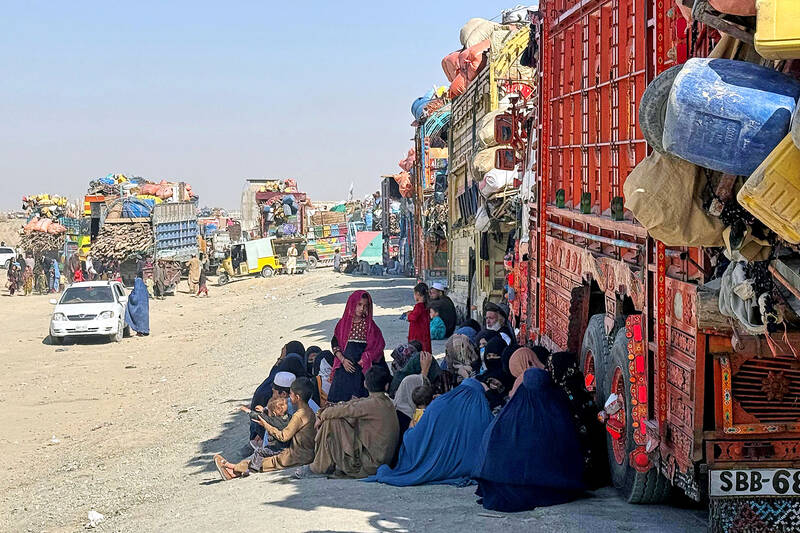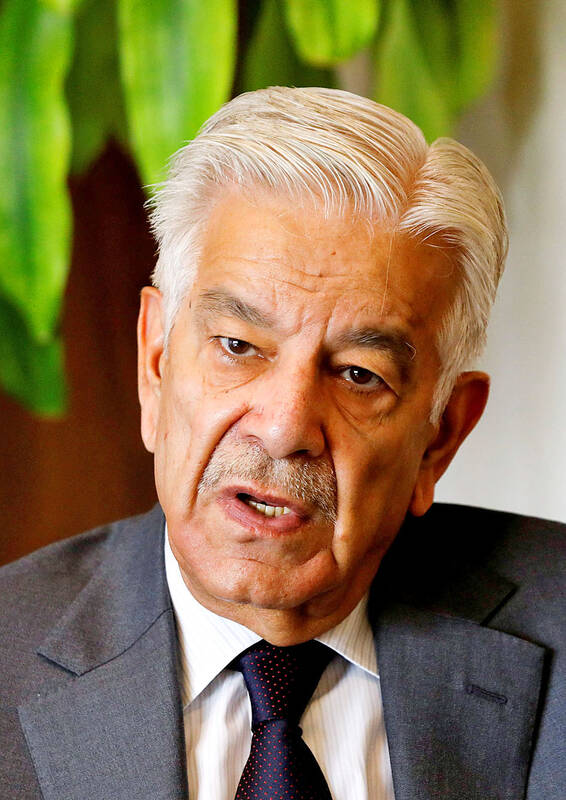Pakistan yesterday said that negotiations for a lasting truce with Afghanistan had “failed to bring about a workable solution,” warning that it would take steps to protect its people.
Pakistan and Afghanistan have been holding negotiations in Istanbul, Turkey, aimed at securing peace after the South Asian neighbors’ deadliest border clashes in years.
The violence, which killed more than 70 people and wounded hundreds, erupted following explosions in Kabul on Oct. 9 that the Taliban authorities blamed on Pakistan.

Photo: AP
“Regrettably, the Afghan side gave no assurances, kept deviating from the core issue and resorted to blame game, deflection and ruses,” Pakistani Minister of Information and Broadcasting Attaullah Tarar wrote on X after four days of negotiations brokered by Qatar and Turkey.
“The dialogue thus failed to bring about any workable solution,” Tarar added.
Pakistan engaged with Afghanistan in the spirit of peace, but Kabul has continued its “unabated support to anti-Pakistan terrorists,” he said.

Photo: Reuters
“We will continue to take all possible measures necessary to protect our people from the menace of terrorism,” he said, vowing to “decimate the terrorists, their sanctuaries, their abetters and supporters.”
There was no immediate comment from Afghanistan.
Relations between the one-time allies, who share a 2,600km frontier, have soured in the past few years over accusations from Islamabad that Afghanistan harbors militant groups that stage attacks in Pakistan.

Photo: Reuters
Of particular concern to Islamabad is the Tehreek-e-Taliban Pakistan (TTP) militant group, which Islamabad has been demanding action against.
Pakistan accuses the Taliban authorities of allowing the TTP to use Afghan territory as a “training-cum-logistic base and jump off point for terrorist activities,” Tarar wrote.
The Taliban government has denied the allegations.
After the Oct. 9 explosions in Kabul, which coincided with a visit to New Delhi by Afghan Minister of Foreign Affairs Amir Muttaqi, the Taliban launched a retaliatory border offensive, prompting a response from Pakistan.
An initial 48-hour ceasefire lapsed before a second truce emerged on Oct. 19 following talks in Doha, also brokered by Qatar and Turkey.
The border between the two neighbors has been closed for more than two weeks, with only Afghans expelled from Pakistan allowed to cross.
In the Afghan border town of Spin Boldak, a driver on Monday told reporters that “fruit is rotting” in trucks.
“There are 50 to 60 trucks, some with apples, others with pomegranates and grapes,” said 25-year-old Gul, who only gave his first name. “We wait and call on the government to reopen” the border.
A Pakistani security source on Tuesday said that the Afghan Taliban delegation initially agreed to Islamabad’s call for “credible and decisive action” against the TTP.
However, the Afghan side “reversed its position repeatedly after instructions from Kabul,” said the source, who was not authorized to discuss the talks publicly.
Pakistani Minister of Defense Khawaja Asif on Saturday said that failure to reach a deal could lead to “open war.”
Afghan Ministry of the Interior spokesman Abdul Mateen Qani on Tuesday said that any attack would be met with a response “that will serve as a lesson for Pakistan and a message for others.”
“It’s true that we do not possess nuclear weapons, but neither did NATO nor the United States manage to subdue Afghanistan despite 20 years of war,” Qani told Afghan media outlet Ariana News.
The violence killed at least 50 Afghan civilians and wounded 447 others in one week, the UN mission in Afghanistan said on Monday.
Pakistan’s military on Oct. 12 said that 23 personnel had been killed and 29 wounded, without detailing civilian casualties.

Indonesia and Malaysia have become the first countries to block Grok, the artificial intelligence (AI) chatbot developed by Elon Musk’s xAI, after authorities said it was being misused to generate sexually explicit and nonconsensual images. The moves reflect growing global concern over generative AI tools that can produce realistic images, sound and text, while existing safeguards fail to prevent their abuse. The Grok chatbot, which is accessed through Musk’s social media platform X, has been criticized for generating manipulated images, including depictions of women in bikinis or sexually explicit poses, as well as images involving children. Regulators in the two Southeast Asian

COMMUNIST ALIGNMENT: To Lam wants to combine party chief and state presidency roles, with the decision resting on the election of 200 new party delegates next week Communist Party of Vietnam General Secretary To Lam is seeking to combine his party role with the state presidency, officials said, in a move that would align Vietnam’s political structure more closely to China’s, where President Xi Jinping (習近平) heads the party and state. Next week about 1,600 delegates are to gather in Hanoi to commence a week-long communist party congress, held every five years to select new leaders and set policy goals for the single-party state. Lam, 68, bade for both top positions at a party meeting last month, seeking initial party approval ahead of the congress, three people briefed by

The Chinese Embassy in Manila yesterday said it has filed a diplomatic protest against a Philippine Coast Guard spokesman over a social media post that included cartoonish images of Chinese President Xi Jinping (習近平). Philippine Coast Guard spokesman Jay Tarriela and an embassy official had been trading barbs since last week over issues concerning the disputed South China Sea. The crucial waterway, which Beijing claims historic rights to despite an international ruling that its assertion has no legal basis, has been the site of repeated clashes between Chinese and Philippine vessels. Tarriela’s Facebook post on Wednesday included a photo of him giving a

ICE DISPUTE: The Trump administration has sought to paint Good as a ‘domestic terrorist,’ insisting that the agent who fatally shot her was acting in self-defense Thousands of demonstrators chanting the name of the woman killed by a US federal agent in Minneapolis, Minnesota, took to the city’s streets on Saturday, amid widespread anger at use of force in the immigration crackdown of US President Donald Trump. Organizers said more than 1,000 events were planned across the US under the slogan “ICE, Out for Good” — referring to the US Immigration and Customs Enforcement, which is drawing growing opposition over its execution of Trump’s effort at mass deportations. The slogan is also a reference to Renee Good, the 37-year-old mother shot dead on Wednesday in her